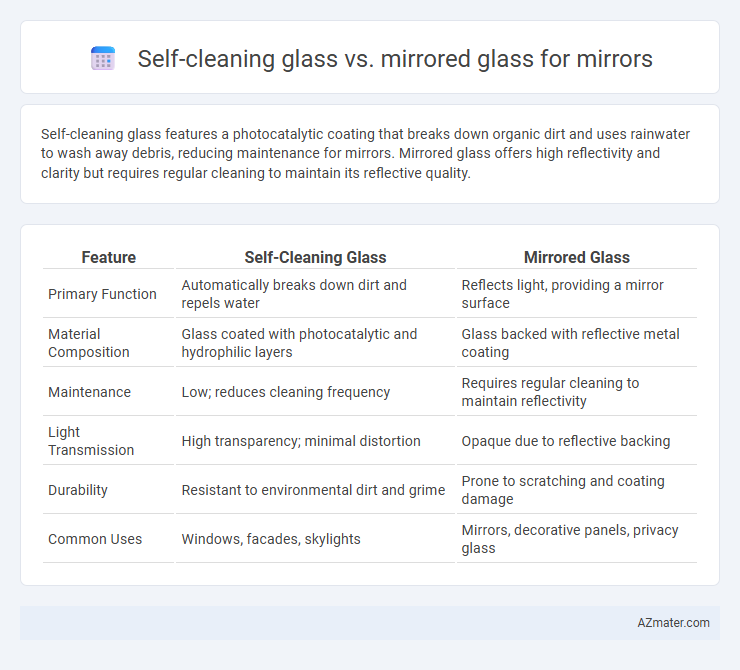Self-cleaning glass features a photocatalytic coating that breaks down organic dirt and uses rainwater to wash away debris, reducing maintenance for mirrors. Mirrored glass offers high reflectivity and clarity but requires regular cleaning to maintain its reflective quality.
Table of Comparison
| Feature | Self-Cleaning Glass | Mirrored Glass |
|---|---|---|
| Primary Function | Automatically breaks down dirt and repels water | Reflects light, providing a mirror surface |
| Material Composition | Glass coated with photocatalytic and hydrophilic layers | Glass backed with reflective metal coating |
| Maintenance | Low; reduces cleaning frequency | Requires regular cleaning to maintain reflectivity |
| Light Transmission | High transparency; minimal distortion | Opaque due to reflective backing |
| Durability | Resistant to environmental dirt and grime | Prone to scratching and coating damage |
| Common Uses | Windows, facades, skylights | Mirrors, decorative panels, privacy glass |
Introduction to Self-Cleaning Glass and Mirrored Glass
Self-cleaning glass features a special nanocoating that breaks down organic dirt through photocatalytic and hydrophilic processes, reducing maintenance efforts and enhancing clarity. Mirrored glass, coated with a reflective material such as aluminum or silver, provides one-way visibility and aesthetic appeal, commonly used in privacy applications and architectural designs. Both types cater to distinct needs: self-cleaning glass prioritizes low upkeep and transparency, while mirrored glass emphasizes reflection and visual privacy.
How Self-Cleaning Glass Technology Works
Self-cleaning glass utilizes a special coating made from titanium dioxide that activates when exposed to UV light, breaking down organic dirt on the surface. This photocatalytic process combined with a hydrophilic layer causes water to spread evenly, washing away residues and preventing streaks. Mirrored glass, while reflective, lacks this technology and requires manual cleaning to maintain clarity and appearance.
What is Mirrored Glass?
Mirrored glass is a type of glass coated with a reflective metallic layer that creates a mirror-like surface, providing privacy while reflecting light and images. It is commonly used in windows, mirrors, and decorative applications to enhance aesthetics and functionality. Unlike self-cleaning glass, mirrored glass does not possess special coatings to repel dirt or reduce maintenance but excels in creating reflective surfaces for visibility control.
Key Differences Between Self-Cleaning and Mirrored Glass
Self-cleaning glass utilizes a special photocatalytic coating that breaks down organic dirt and enables rainwater to wash away debris, reducing maintenance and enhancing transparency over time. Mirrored glass, often coated with a reflective metallic layer, primarily functions to provide one-way privacy by reflecting light, creating a mirror effect on one side while maintaining see-through visibility on the other. Key differences include self-cleaning glass's emphasis on cleanliness and clarity through chemical reactions, versus mirrored glass's focus on privacy and light control through reflective properties.
Advantages of Self-Cleaning Glass for Mirrors
Self-cleaning glass for mirrors offers significant advantages by reducing maintenance efforts through its hydrophilic coating that breaks down organic dirt and prevents water spots. This technology ensures clearer reflections over time, making it ideal for high-use environments where manual cleaning is impractical. Compared to mirrored glass, self-cleaning glass extends mirror longevity and enhances visual clarity without frequent intervention.
Benefits of Mirrored Glass in Interior Design
Mirrored glass enhances interior design by creating a sense of spaciousness through reflective surfaces that amplify natural light, making rooms appear larger and brighter. It provides a sleek, modern aesthetic that integrates seamlessly with various decor styles while increasing privacy by reflecting the surrounding environment. Unlike self-cleaning glass, mirrored glass offers consistent visual impact and decorative versatility, making it an ideal choice for accent walls, partitions, and contemporary mirror installations.
Maintenance Requirements: Self-Cleaning vs Mirrored Glass
Self-cleaning glass reduces maintenance by utilizing a hydrophilic coating that breaks down organic dirt and allows rainwater to wash away debris, significantly minimizing cleaning frequency. Mirrored glass requires regular cleaning to maintain reflectivity and prevent water spots, fingerprints, and dust buildup, increasing upkeep time and effort. Choosing self-cleaning glass enhances durability and reduces labor and chemical use, making it ideal for hard-to-reach mirror installations.
Durability and Longevity Comparison
Self-cleaning glass features a hydrophilic coating that breaks down organic dirt and resists water spots, enhancing its longevity by reducing maintenance frequency and potential surface damage. Mirrored glass, typically coated with reflective metals like silver or aluminum, offers durability but is prone to scratching and tarnishing over time, especially in high-humidity or outdoor environments. The advanced coating technology in self-cleaning glass extends its lifespan significantly compared to mirrored glass, which often requires protective treatments to maintain its reflective quality.
Cost Analysis: Self-Cleaning Glass vs Mirrored Glass
Self-cleaning glass typically carries higher upfront costs due to specialized coatings and advanced technology, whereas mirrored glass is generally more affordable, relying on reflective metal layers. The long-term maintenance savings of self-cleaning glass, which reduces cleaning frequency and labor costs, can offset its initial investment compared to mirrored glass that requires regular upkeep to maintain reflectivity and appearance. Evaluating total cost of ownership involves balancing the premium price of self-cleaning features against ongoing maintenance and replacement expenses associated with mirrored glass.
Choosing the Right Glass for Your Mirror: Factors to Consider
Self-cleaning glass for mirrors reduces maintenance by using a special coating that breaks down organic dirt and repels water, making it ideal for bathroom or high-humidity areas. Mirrored glass, offering superior reflectivity and clarity, is often preferred for decorative or functional mirrors where visual precision is crucial. Consider factors such as location, ease of cleaning, and desired visual effect when choosing between self-cleaning and mirrored glass to ensure optimal performance and longevity.

Infographic: Self-cleaning glass vs Mirrored glass for Mirror
 azmater.com
azmater.com